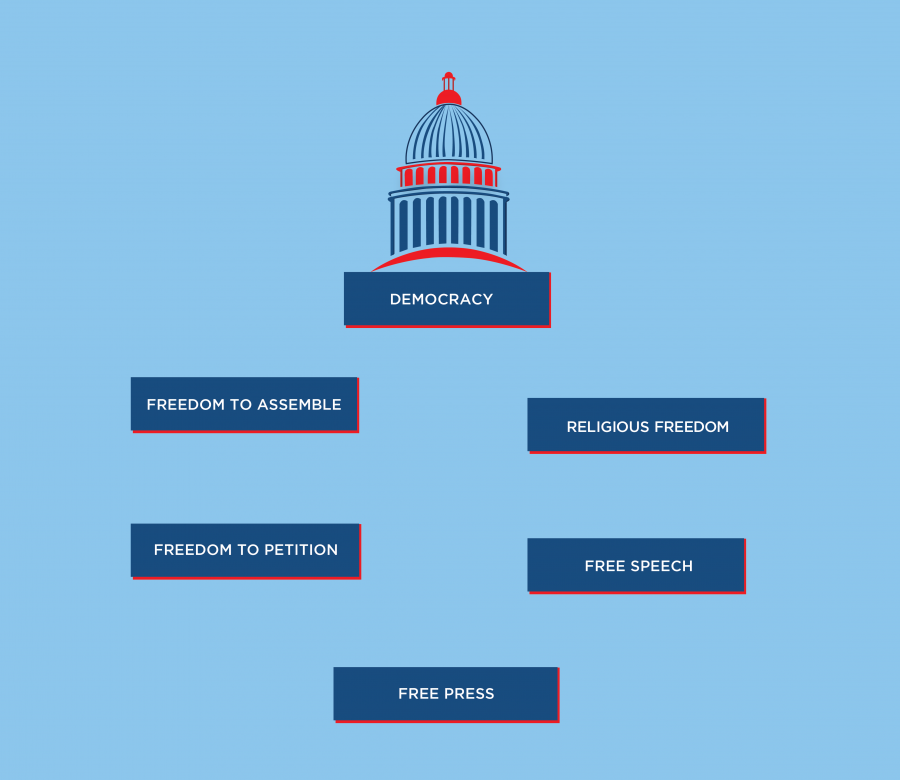Central hosts First Amendment Festival
May 4, 2016
When Cynthia Mitchell, associate professor of journalism, first read in a survey that most students don’t understand the First Amendment, she wanted to scream.
“I thought to myself, ‘You’ve got to be kidding.’ How can I teach the next generation of journalists if they’re going to be working in a culture that doesn’t even understand and support its freedoms?” she said.
So she decided to do something about it. The result was the first First Amendment Festival at Central, which she created in the 2006-2007 school year.
That initial effort was a yearlong dialogue with 17 events that shined a light on the First Amendment. It included a series of speakers who talked about some of the most cherished rights for Americans.
However, while the event was beneficial to students and faculty on campus, Mitchell said it was not sustainable to do a year very often.
So, after taking a several-year hiatus from coordinating such an ambitious endeavor, Mitchell decided to bring it back as a more manageable, week-long festival in 2013.
That year, Mitchell brought in Glenn Greenwald. the journalist best known for reporting the mass surveillance leaks of Edward Snowden. In 2014, the festival featured Mary Beth Tinker, who was only 13 years old when she was expelled from school in 1965 after exercising her First Amendment rights by wearing a black armband to protest the Vietnam War.
Last year, Mitchell and another Central professor, Jay Ball, collaborated on a performance about Rachel Corrie, a young woman from Evergreen College who was killed during a protest of the destruction of a Palestinian home in the Gaza Strip.
“It was incredibly moving,” Mitchell said. “Cindy and Craig Corrie have done incredible work to promote social justice in the wake of their tragic loss.”
This year, Mitchell is collaborating with the year of dialogue on mass incarceration. She’s also working with an event planning class to put on the events in the festival.
Normally, Mitchell and an intern will work together throughout winter and spring quarters to put on the four-day festival in May. All of the events are held in the Student Union and Recreation Building.
Travis Isaman, a senior public relations major and event coordinator for the festival, said this is his first time working at the event, but he has participated for the last three years.
“To me, the First Amendment is one of the most important aspects of American culture that often gets overlooked,” he said. “Though many people are afraid of getting stripped of these rights, many people are not even aware of what the First Amendment fully entails.”
He added that he’s most excited for the “Make Your Own Protest Sign” stations that will be set up from Monday to Thursday on both of the SURC patios.
“It is awesome to see all of the students who take part, marching around campus with a sign that allows them to flex their First Amendment rights,” he said.
Additionally, students can participate by leaving messages on the free speech walls on the East and West SURC patios. Students can write whatever they want on the walls, which will be up throughout the entire festival, according to Mitchell.
On Monday and Tuesday, the SURC Pit will be the site of a series of debates. Students can pick a side regarding the recent legalization of marijuana in Washington, and say what’s on their minds regarding the upcoming presidential election.
On Wednesday, Pulitzer Prize-winning author Douglas Blackmon will be the festival’s keynote speaker. His book, “Slavery by Another Name: The Re-Enslavement of Black Americans from the Civil War to World War II,” highlights the injustices against and persistent enslavement of African Americans from 1865 into the 20th century.
“It’s fundamental to American democracy. Democracy can’t work without it [The First Amendment] that’s one thing the founding fathers were completely right about,” Blackmon said. “They absolutely understood it had to be [a] wide open, independent, exchange of information or democracy couldn’t work. Any kind of a free market society can’t work if there are controls on the flow of information.”
On Thursday, students can give up their First Amendment rights for a piece of free pizza at ‘Food For Thought’ on the SURC East Patio.
“People don’t know what to expect, but they find out pretty quickly that you can’t sit with your friends because that’s freedom of assembly,” Mitchell said with a smile. “We have a complaint box and a complaints table, but nobody staffs it and you can’t put anything in it because that’s freedom of petition.”
Mitchell said around a dozen students dress up in all black and carry billy clubs to act as enforcers.
Additionally, students dressed in religious garb or acting as journalists will be hauled away by the enforcers to demonstrate what would happen if the First Amendment was taken away.
For the latter, Mitchell herself gets involved by taking on the role of a protester, which gets her hauled off by the enforcers.
“Even though I’ve done this how many times, and I plan it,” she said, “it still really pisses me off at a real gut level when they try to drag me away, like ‘No! That’s my right!”


